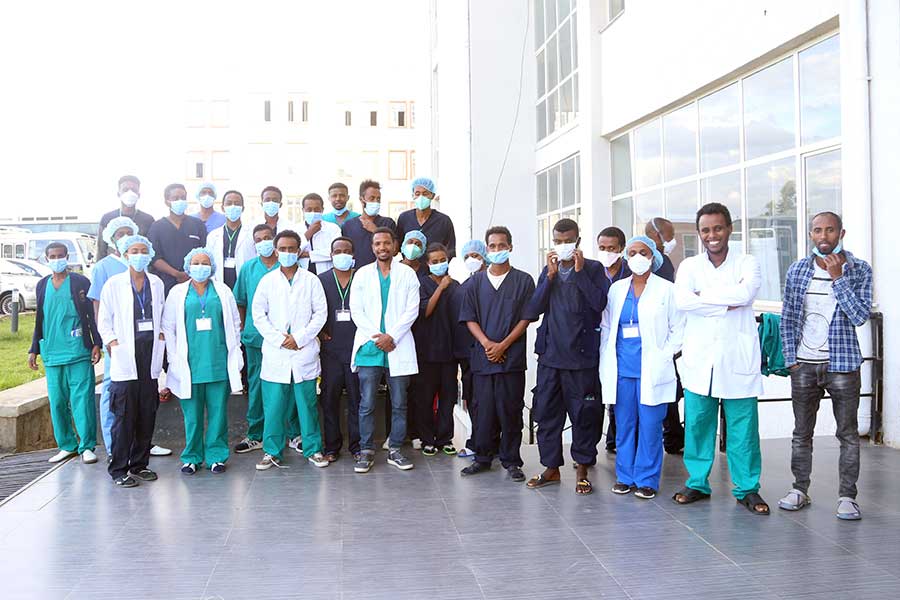
Viewpoints | Nov 21,2018
Jul 31 , 2021
By Asegid Getachew
Management is a discipline that combines science and art. A certain mix of scientific principles and methods, and craft (art) emanating from experience create a full-fledged managerial practice.
However, the extent of their proportion has been a debatable issue for researchers and thinkers in the area. Some claim that graduate students, regardless of their previous managerial experience, can make it into managerial ranks if they are exposed to training regarding management science. Some, however, argue that previous managerial experience is a mandatory prerequisite to learn management. Their view is that one cannot simply read about a craft on paper and hope to be good at it in real life. Practice, as they say, makes perfect.
Bringing this view to the forefront was a publication titled, “Managers Not MBAs: A Hard Look at the Soft Practice of Managing and Management Development.” Written by Henry Mintzberg, a management expert, author, and academic, it strongly criticises conventional MBA programmes.
“The MBA trains the wrong people in the wrong ways with the wrong consequences,” Mintzberg argues. “Using the classroom to help develop people already practicing management is a fine idea, but pretending to create managers out of people who have never managed is a sham.”
In conventional MBA classes, lectures, projects, case studies and even business simulation games train future business administrators and investment managers. But these classes can only go far enough to train technical analysts that can apply one-size-fits-all solutions to real-world problems. It does not create managers that can solve problems in a specific context.
Mintzberg and his supporters were dismayed by the methods used by MBA schools to the point they launched programmes that offer graduate-level education for managers. Called International Masters Programme for Practicing Managers, admission requires requisite experience in managing.
“The Programme focuses on the practice of managing in context. It strives to make better managers, by making craftspeople instead of analysts,” as Mintzberg puts it.
Despite such stern criticism, MBA programmes are still coveted, and graduates with the degree are one of the most demanded and sought after by employers. It is offered in Ivy League universities as well as questionably accredited private schools across the globe.
Ethiopia is no different. Most of the business and economics colleges in the public universities offer MBA programmes at a post-graduate level in at least one specialisation. While this is commendable and should continue alongside the MBA programs, these universities should also develop a curriculum and launch programmes to teach management practice at a graduate level.
Chief executive officers (CEOs), middle level and lower-level managers could be the targets. This group are already practising management and can further benefit from the opportunity of higher-level training that can enhance their knowledge of managing in a specific context.
This is critical for one specific reason. Programmes in other countries may be offering one-size-fits-all training to graduates, but at least they are offering one designed with scenarios prevalent to their countries’ context. This is especially true for Western countries. Ethiopian Universities and colleges can follow suit by developing programmes that are relevant to the business context of the country. As the aim is to develop managers who can make decisions and solve problems in a specific context, their programmes should be specific to real-world business challenges and should properly consider the theoretical policy frameworks applicable to the economy.
“Management is not marketing plus finance plus accounting and so forth. It is about these things, but it is not these things,” Mintzberg wrote in his seminal book. “Pour each of these functions, of a different colour, into the empty vessel called an MBA student, stir lightly, and you end up with a set of specialised stripes, not a blended manager.”
PUBLISHED ON
Jul 31,2021 [ VOL
22 , NO
1109]


Viewpoints | Nov 21,2018

Fortune News | Sep 02,2023

View From Arada | May 01,2020

Viewpoints | Nov 04,2023

Commentaries | Apr 26,2025

Viewpoints | Dec 17,2022

Radar | Jul 15,2023

Fortune News | Sep 18,2022

View From Arada | Feb 04,2023

Covid-19 | Apr 17,2020

My Opinion | 131974 Views | Aug 14,2021

My Opinion | 128363 Views | Aug 21,2021

My Opinion | 126301 Views | Sep 10,2021

My Opinion | 123917 Views | Aug 07,2021

Dec 22 , 2024 . By TIZITA SHEWAFERAW
Charged with transforming colossal state-owned enterprises into modern and competitiv...

Aug 18 , 2024 . By AKSAH ITALO
Although predictable Yonas Zerihun's job in the ride-hailing service is not immune to...

Jul 28 , 2024 . By TIZITA SHEWAFERAW
Unhabitual, perhaps too many, Samuel Gebreyohannes, 38, used to occasionally enjoy a couple of beers at breakfast. However, he recently swit...

Jul 13 , 2024 . By AKSAH ITALO
Investors who rely on tractors, trucks, and field vehicles for commuting, transporting commodities, and f...

Jul 5 , 2025
Six years ago, Ethiopia was the darling of international liberal commentators. A year...

Jun 28 , 2025
Meseret Damtie, the assertive auditor general, has never been shy about naming names...

Jun 21 , 2025
A well-worn adage says, “Budget is not destiny, but it is direction.” Examining t...

Jun 14 , 2025
Yet again, the Horn of Africa is bracing for trouble. A region already frayed by wars...

Jul 6 , 2025 . By BEZAWIT HULUAGER
The federal legislature gave Prime Minister Abiy Ahmed (PhD) what he wanted: a 1.9 tr...

Jul 6 , 2025 . By YITBAREK GETACHEW
In a city rising skyward at breakneck speed, a reckoning has arrived. Authorities in...

Jul 6 , 2025 . By NAHOM AYELE
A landmark directive from the Ministry of Finance signals a paradigm shift in the cou...

Jul 6 , 2025 . By NAHOM AYELE
Awash Bank has announced plans to establish a dedicated investment banking subsidiary...